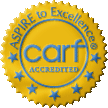 Oconee Center offers various services to eligible individuals living with developmental disabilities. These services provide a way for you or your loved ones to grow and become a part of a larger community. Services that we offer and a brief description are below.
Oconee Center offers various services to eligible individuals living with developmental disabilities. These services provide a way for you or your loved ones to grow and become a part of a larger community. Services that we offer and a brief description are below.
Community Access Services
Community Access Services are designed to assist participants in acquiring, retaining, or improving self-help, socialization, and adaptive skills required for active community participation and independent functioning outside the participant’ or family home. These services may include training in the areas of daily living skills (including leisure/recreation skills); communication training; mobility training; programming to reduce inappropriate and/or maladaptive behaviors; and training in the use of common community resources.
Community Residential Alternative
Community Residential Alternative (CRA) services are targeted for participants who require intense levels of support. These services are a range of interventions with a particular focus on training and support in one or more of the following areas: eating and drinking, toileting, personal grooming and health care, dressing, communication, interpersonal relationships, mobility, home management, and use of leisure time. CRA Services are individually planned and tailored to meet the specific needs of the participant and to accommodate fluctuations in his or her needs for various services. CRA services include assistance with and/or training in activities of daily living, such as bathing, dressing, grooming, other personal hygiene, feeding, toileting, transferring, and other similar tasks. These services also include training and/or assistance in household care, such as meal preparation, clothes laundering, bed making, housecleaning, simple home repair, yard care, and other similar tasks. CRA services consist of medically related services, such as basic first aid, arranging and transporting participants to medical appointments, assisting with therapeutic exercises, and assisting with or supervising self-administration of medication.
Supported Employment Services
Supported Employment Services are ongoing services that give participants help to become a part of competitive employment opportunities. Supported Employment services are conducted in a variety of settings, particularly work sites where persons without disabilities are employed. Participants who receive Supported Employment services must require long-term, direct, or indirect job related support in job supervision, adapting equipment, adapting behaviors, transportation assistance, peer support, and/or personal care assistance during the work day. Supported Employment services focus on rapid job search as apposed to more transitional training and consist of activities needed to obtain and sustain a job. These activities include job development and placement, training, and supports that assist participants in achieving self-employment in part or full-time jobs.
To attain more detailed information about the above programs you may visit DBHDD’s website at https://dbhdd.georgia.gov/
